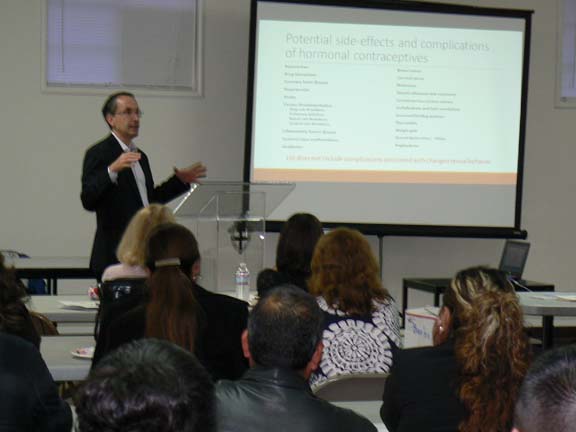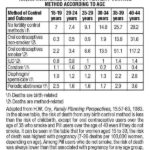- Medical Matters
Is Being Pregnant Riskier than Using the Pill?
by Michel Accad, MD
Yes hormonal contraception has risks, but pregnancy is even more risky!”
No doubt, readers of the CANFP NEWS are familiar with this argument or a version of it. What may be less familiar is the “evidence” that pill pushers use to advance that claim.
While preparing a CANFP talk on the physical harms of contraception, I came across the following table that claims to compare the risks of childbirth-related deaths to the risks of death from methods of “fertility control” employed by women, broken down by age group. Not surprisingly, the table indicates that to use oral contraception is generally much safer than to be pregnant. I found the table in the package insert of one of the pills but, as far as I can tell, the table seems to be included in the package insert of every single oral contraceptive. That surprised me, since each package insert is prepared independently by the manufacturer before being sanctioned by the FDA. But that also told me that, in all likelihood, the table represents the strongest possible evidence pill advocates can muster to support the claim that pregnancy is more risky than contraception.
So I examined the table and the paper to find out how strong the evidence really was, and the first thing that I noticed was that the reference from which the table was adapted was published in 1982. Not exactly the most current information!
The second thing I noticed was that the name of the journal in which the paper was published, Family Planning Perspectives, didn’t sound like a major medical publication that would have the highest standard of scholarship. In fact, the name seemed to betray a certain point of view on the question…Well, you may have guessed it already, but Family Planning Perspectives was in fact a journal published by no other than the Guttmacher Institute, the “research” arm of Planned Parenthood! How is that for an unbiased perspective?!
More importantly, the idea that one could accurately compare mortality rates from pregnancy to those of contraception struck me as likely to be fraught with great methodological difficulty. To begin with, any paper that purports to make a meaningful mortality comparison between different groups must ensure that the groups are reasonably similar in all aspects, except in regards to the variable of interest (e.g., in this case, the method of fertility control). Did this paper rise to the challenge?
As you might expect, the article didn’t even attempt to address this difficulty. The author, a physician of the Center for Disease Control (CDC), simply plucked mortality rate estimates from a handful of studies, each of which looked at a given group, and each of which had its own follow-up period, its own particularities, and its own methodological limitations. The data thus extracted could not possibly be used to make any meaningful comparisons between the groups.
The paper made no attempt to control for various factors that might affect the mortality rates. In fact, one could argue that the mere attempt to compare “childbirth related death rates to “method related” death rates is scientifically suspect, if not ludicrous, since using or not using a method of fertility control is a choice, and human choices are influenced by an unfathomable number of personal and socio-economic factors. Any of these factors could have an independent influence on mortality rates, and there is really no good way to attribute the difference in mortality to the use or method of fertility control.
And if we must compare “method-related” death rates to “birth-related” death rates, one would also think that the time frame for follow-up would be important. Shouldn’t long term survival be the variable of interest as opposed to annual mortality? For example, we know that using hormonal contraceptives and delaying childbirth are associated with increased breast cancer risks. Did the article take this into account?
As it turns out, in those studies chosen to estimate oral contraceptive-related deaths, only deaths from blood clots, strokes and heart attacks were counted against the pill. Yet we know that the use of the pill can alter a woman’s behavior and circumstances in a multiplicity of ways, some of which could very reasonably be a factor in lethal outcomes. In addition to increased cancer risks, some studies have shown increased suicide rates among current or former pill users. Yet none of these outcomes were counted against the pill here.
One of the most egregious way in which the article skewed the data in favor of oral contraceptives can be appreciated in the following quote from the paper:
“Estimates of maternal mortality published here are those deaths related to ectopic pregnancy and childbirth, and are based on US vital statistics from 1972 through 1978, inflated by 33 percent to account for well documented under-reporting.” (italics mine)
While it may be the case that US vital statistics under-report childbirth deaths (public health statistics of this sort are notoriously unreliable), it is a scientific sleight-of-hand to selectively increase those numbers, while keeping mortality rates from oral contraceptives to an obviously misleading bare minimum.
And I am barely scratching the surface here. I will spare the readers how mortality rates for women using “periodic abstinence” were determined…
In conclusion, the claim that pregnancy risks are greater than contraceptive risks has no basis in sound scientific evidence. But the evidence that Planned Parenthood and the Guttmacher Institute are playing a game of pure deception, is there for all to see.
About The Author




